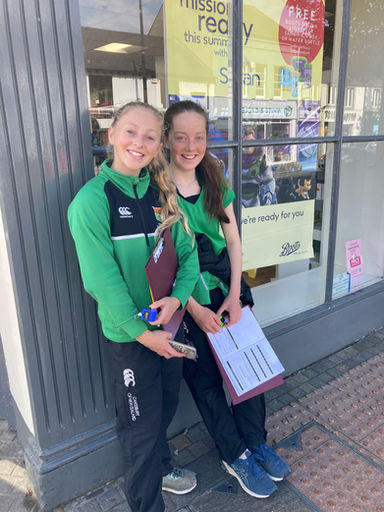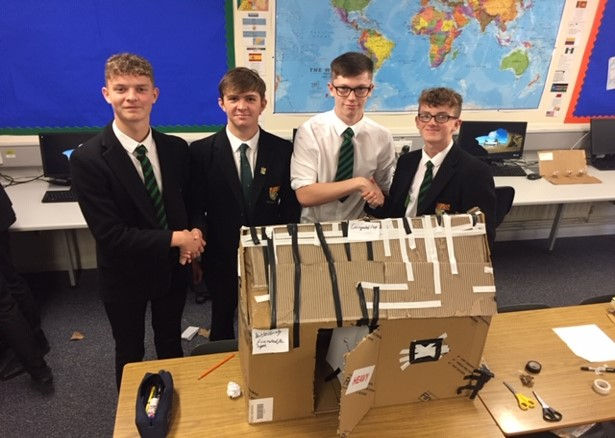
Geography
“Geography is a living, breathing subject, constantly adapting itself to change. It is dynamic and relevant. For me, geography is a great adventure with a purpose.” [Michael Palin]
Departmental Aims
The following desirable pupil outcomes are sought through the study of Geography:
-
To develop their understanding of their surroundings and extend their interest, knowledge and understanding of more distant places.
-
To gain a perspective within which they can place local, national and international events.
-
To learn about the variety of conditions on the earth’s surface; the different ways in which people have reacted to, modified and shaped environments; and the influence of environmental conditions on social, political and economic activities.
-
To gain understanding of the processes which have produced pattern and variety on the earth’s surface, and which bring about change. To develop a sensitive awareness of the contrasting opportunities and constraints facing different peoples living in different places under different economic, social, political and physical conditions.
-
To develop an understanding of the nature of multi-cultural and multi-ethnic societies, a sensitivity to prejudice and values which reject racist views.
-
To develop a wide range of skills and competencies that are required for Geographical enquiry and are widely applicable in other contexts.
-
To act more effectively in their environment as individuals and as members of society.
Staff
Mrs C Johnston (Head of Department)
Mrs P Ravey (Career Break)
Mrs P Richardson
Miss S E Wright (T)
Key Stage 3
We seek to build upon young people’s natural curiosity about the world.
It is our intention to develop in our pupils’ world knowledge, an ability to make sense of current events and to make informed judgements on the economic, political, social and environmental issues.
Physical, Human and Environmental Geography
Geography has a special role to play in fostering better understanding of different cultures both within our own society and elsewhere in the world. It should also encourage pupils to understand the environment and how human activity leads to its use and misuse. Through studying physical and human resources at a variety of scales from the immediate and local, to the world as a whole, pupils learn to move from the familiar and concrete to the more distant, general and abstract.
Geographical Skills
Knowledge, skills and attitudes learned by pupils in Geography lessons contribute to their understanding of other subjects in the school curriculum. Geography contributes knowledge and skills related to subjects as diverse as Mathematics, History, Economics, Religious Education, Science and Information Technology. It also has a contribution to make in helping pupils to develop attitudes of tolerance towards other individuals and communities. Social skills are promoted through the joint planning of work, as in fieldwork, and through group discussions and participation in role playing exercises, geographical games and simulations.
Year 8
What is Geography?
What is Fieldwork?
Fieldwork Study
Our place in the World
O.S. Map Work
Rivers & Flooding
Case Study: Africa
Year 9
Weather & Climate
Latitude & Longitude
Population & Resources
Case Study: China
Coasts
Settlement
Fieldwork Study
Year 10
International Development
Trade Game & Charity Project
Case Study: Malawi & Singapore
Local Geology
Plate Tectonics
Fieldwork Study
Case Study: The Middle East
Key Stage 3 Photo Reel
GCSE Geography
Examination Board: CCEA
Course Content:
The aim of the course is to provide pupils with an understanding of the world into which they are growing and to which they contribute. Emphasis is placed on the ways in which people interact with each other and with their environment. One outcome is an encouragement to learn about current global issues and to understand the different communities within our own society and elsewhere in the world.
There are eight themes studied over the two years, four deal with the Natural World and four focus on Living in our World. Topics covered by these themes include:
-
How and why do cities develop and how do they change the countryside?
-
Which management strategies can help reduce flooding in the UK?
-
Is migration a good or bad process for people in Europe?
-
Why is the world map constantly changing?
-
Why are wealthy countries rich and does money answer development problems?
-
Is Global Warming really threatening to change our planet and our future?
In addition to the content material numerous geographical skills are developed with analysis of many graphical and statistical sources including ICT, video, Geographic Information Systems (GIS), satellite images and, of course, maps at various scales.
Unit 1: Understanding our Natural World
This is a 90-minute examination based on four themes as follows:
Theme A: River Environments (25%)
Theme B: Coastal Environments (25%)
Theme C: Our Changing Weather & Climate (25%)
Theme D: The Restless Earth (25%)
Unit 2: Living in Our World
This is a 90-minute examination based on four themes as follows:
Theme A: Population & Migration (25%)
Theme B: Changing Urban Areas (25%)
Theme C: Contrasts in World Development (25%)
Theme D: Managing Our Environment (25%)
Unit 3: Fieldwork
This is a one-hour examination based on a fieldwork study carried out by pupils during their GCSE course. Students base their answers on their knowledge and experience of fieldwork.
Please refer to the Subject Choice for GCSE Information Booklet for further information on full course details and criteria for entry.
GCSE Geography Photo Reel
GCE Geography
Examination Board: CCEA
Course Content: AS Geography
There are three units used to deliver and assess the AS Geography course. These build upon the knowledge and skills gained throughout studying Geography at GCSE level.
Unit 1: Physical Geography
Topics within this theme include:
-
Global biomes and small-scale ecosystems.
-
The processes that shape our weather and climate, weather in the British Isles and global weather issues.
-
The processes that shape fluvial environments and human interaction in fluvial environments.
Unit 2: Human Geography
Topics within this theme include:
-
Population data, population change and the balance between population and resources.
-
Measuring development, reducing the development gap and emerging markets.
-
Planning in rural areas and urban challenges.
Unit 3: Fieldwork Skills and Techniques in Geography
This is a one-hour examination part of which is based on a fieldwork study carried out by pupils during their course. The other part tests geographical skills such as:
-
O.S. map work.
-
Sketch maps.
-
Reading aerial photographs.
-
Using graphs.
-
Using sampling techniques.
-
Using statistical techniques.
Course Content: A2 Geography
There are three assessment units in the A2 Geography course, with two topics studies and a decision-making unit.
A21: Physical Processes, Landforms and Management
Option A: Plate Tectonics, Theory & Outcomes
Option C: Dynamic Coastal Environments
A22: Processes and Issues in Human Geography
Option B: Planning for Sustainable Settlements
Option D: Tourism
A23: Decision Making Exercise
This is a 90-minute paper in which students deal with a real-world scenario. Students develop their decision-making skills in a real-world geographical issue. Students are required to assess a case study through a wide range of resources, write a report and to adopt a role in a planning decision.
A-Level geography pupils also benefit from presentations throughout the year and attend Geographical Association lectures at QUB which are relevant to their course.
Please refer to the Subject Choice for AS/A Level Information Booklet for further information on full course details and criteria for entry.
A Level Geography Photo Reel
Barcelona 2023






















































